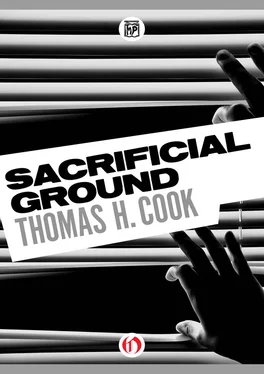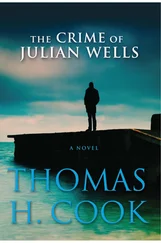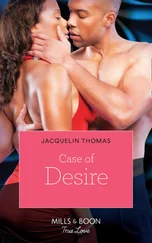Frank nodded.
“So I figured her connection was in Grant Park, and that’s why she knew the area.”
“Sounds good,” Frank said.
“To me, too,” Caleb said, “but as the talk kept going, things fell apart.”
“What do you mean?”
“Well, there’s no doubt that Angelica had done a few drugs in her time,” Caleb told him. “About three months before she died, this one kid spots her at one of these fast-food drive-ins. He goes over to her, and smoke just about keels him over.”
“Three months ago?”
“That’s right, and that’s about the last time anybody saw Angelica with drugs.”
“She just stopped?”
“Dead in the road, Frank,” Caleb said. “Went totally off everything, as far as they know. Everybody agrees on that one.”
Frank wrote it down.
“And that’s not all,” Caleb added. “She cleaned up her diet, too.” He pulled a chair over to Frank’s desk and sat down.
“Diet?”
“Angelica was a junk-food freak, the kids say. Always with the Fat Freddies and potato chips.”
“She stopped that, too?”
“Dead in the water,” Caleb said.
“And at the same time?”
“On the button. And this was before she found out she was pregnant.”
Frank leaned forward slightly. “What was happening to her, Caleb?”
“She acts like somebody who all of a sudden got religion.”
“So what was it? A change of heart?”
Caleb looked at Frank doubtfully. “When have you ever seen a case of that?”
Frank smiled.
“No, you were right the first time,” Caleb said. “Something was happening to her.”
“Yeah.”
“It’s the Grant Park stuff I can’t figure,” Caleb said after a moment. “I mean, everything is backwards. She should have met Grant Park on the way down. But it’s like she met it on the way up. You know what I mean, Frank? She met it when she was going off drugs, not when she was going on them.”
Frank shook his head wearily. “I have the strangest feeling about this one, Caleb.”
“That’s because nothing fits.”
“Something goes very deep down in this one,” Frank said. “You can’t follow blood. You can’t follow money.” He shook his head despairingly. “So where do you go?” He flipped to the first page of his notebook. “Just back over everything, I guess.”
He began reading his notebook.
“You’re a slow healer, Frank,” Caleb said after he’d watched him for a while.
Frank looked up. “What?”
“Your face,” Caleb explained. “It don’t look much better than it did a few days ago. You’re a slow healer.”
“Always have been,” Frank said indifferently, as he returned to the notebook.
It was more like a sketchbook than anything else, and as Frank began the tortuous task of deciphering the minute, broken scrawl of his handwriting, it seemed to him that his notes contained little more than the basic facts of the case as he had meticulously gathered them. Aside from these, there was only an assortment of random thoughts and asides, intimations about character, impressions concerning how a particular person looked or spoke or gestured. He had noted that Arthur Cummings “appeared confident in his wealth and his innocence,” and that Davon Little had talked in a loud voice, as if he knew that what he said was true.
“What are you looking for, Frank?” Caleb asked finally.
“I don’t know,” Frank admitted, but he continued to flip the pages of his notebook. He had noted that Albert Morrison was “very controlled,” and that Jameson, the drama teacher, “had something sick in his eyes.”
He turned another page, then another, until he was at Karen’s house again. He had written that James Theodore “wanted to say something,” and now those four words struck him as the only important ones he had come across so far.
He closed the notebook and looked up at Caleb. “Maybe we should turn up the burner a little,” he said.
“How do you want to do it?”
“You take the park,” Frank said.
“Anybody in particular?”
“Dealers, mostly,” Frank said. “It’s still possible that Angelica had a connection around there. Maybe it’s old, but it still might be worth something.”
“Okay.”
“And do me a favor,” Frank added. “Go light at first. Just show them the pictures of Angelica, and see if anybody’s seen her in the area.”
“Good enough,” Caleb said. “See you this afternoon.”
When Caleb had left, Frank pulled the telephone book from his desk drawer and looked up the address of the Nouveau Gallery. It was located in one of the vast, sprawling malls on the city’s North-side.
He arrived at the mall quite early, and most of the shops were still closed. The mall was almost entirely deserted, but as he neared the brightly lit windows of the Nouveau Gallery, he could see Theodore at the back wall, struggling to hang an enormous picture. He tapped at the glass door, and Theodore turned immediately, lowered the picture carefully to the floor, and came to the door.
“Hello, Mr. Clemons,” he said coolly as he opened it.
“I wonder if I could talk to you for a few minutes,” Frank said.
“Of course,” Theodore said. He opened the door more widely. “Come in.”
“Thanks.”
Theodore locked the door once again, then turned to Frank. “I don’t suppose you’re here to buy a painting,” he said.
“No.”
“Angelica?”
Frank nodded.
“Yes, of course,” Theodore said. He glanced at his watch. “My assistant will be here in a few minutes, but we should have a little privacy before then.” He pointed to a door at the back of the shop. “We can talk in my office.”
Frank followed him into a small, cramped office whose walls were lined with stacks of paintings.
“Do you like paintings, Mr. Clemons?” Theodore asked as he sat down behind his desk.
“I don’t know much about them,” Frank told him.
“You don’t have to,” Theodore said. He nodded toward a large painting of a woman standing beside a lake. “Something like that is either beautiful or not.” He tapped the side of his head with a single index finger. “And whether one finds it beautiful or not depends upon how one sees it, what one thinks about it.” He smiled. “It requires no expertise.”
Frank took out his notebook. “Do you remember when we were at Karen’s together?”
“Yes.”
“I made a note as I talked to you.” Frank flipped through the notebook until he found the right page. “We only talked for a few minutes, and then Karen came down the stairs. Do you remember?”
“Yes.”
“I made the note just then.” He handed Theodore the notebook. “See?”
Theodore glanced at the page. “‘Wanted to say something,’” he repeated. He looked up at Frank. “You mean me?”
“Yes.”
Theodore handed the notebook back to Frank. “What gave you that idea?”
“I don’t know,” Frank admitted. “It could have been anything.”
“It hardly matters in any event,” Theodore said.
“What do you mean?”
“It’s true,” Theodore said, “I did want to say something.”
Frank flipped through his notebook until he found a blank page. “What?”
“Well,” Theodore began, “I didn’t want to talk to you that afternoon. At least, I didn’t want to talk to you in front of Karen.”
“Why not?”
“Because what I had to say would hardly have helped her situation.”
“Something about Angelica, you mean?”
“Yes,” Theodore said.
“Then why didn’t you talk to me later?”
Theodore shook his head. “I don’t know. I really don’t. It’s very easy to avoid unpleasantness.” He smiled thinly. “That’s what most of the people around me spend most of their lives doing, after all.”
Читать дальше












